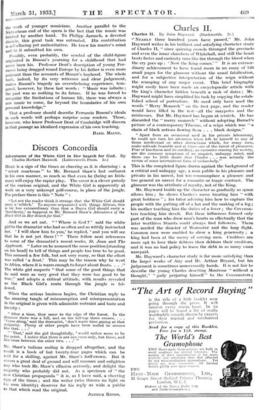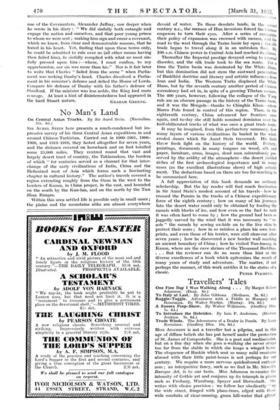Charles II.
Charles II. By John Hayward. (Duckworth. 2s.) " NEARLY three hundred years have passed," Mr. John Hayward writes in his brilliant and satisfying character study of Charles II, " since quizzing crowds thronged the precincts and even the inner chambers of Whitehall, and still the heart beats faster and curiosity runs like fire through the blood when the cry goes up : Now the King comes.' " It is an extraor- dinary achievement to have found room in an essay of 126 small pages for the glamour without the usual falsification, and for a subjective interpretation of the reign without the seamping of any major event. This brief biography might easily have been made an encyclopaedic article with the king's character hidden beneath a rash of dates ; Mr. , Hayward might have simplified his task by copying the estab- lished school of portraiture. He need only have used the Words " Merry Monarch " on the first page, and the reader would have filled in the. rest—all the maypoles and the mistresses. But Mr. Hayward has begun at scratch. He has . discarded the " merry monarch " without adopting Burnet‘s picture of a contemporary Tiberius, of a reign which was " a chain of black actions flowing from . . . black designs."
" Apart from an occasional spell in his private laboratory, he could not turn his attention when left to himself to any of those intellectual or other distractions which, for many mon, make solitude bearable and at times one of the rarest of pleasures. Fear of loneliness and its corollary, an excessive craving for society, are the common symptoms of an unquiet, unhappy mind, and there can be little doubt that Charles . . . was actually the victim of some intermittent form of melancholy."
This is the completed figure drawn against the background of a critical and unhappy age, a man public in his pleasure and private in his unrest, but too commonplace a pleasure and too general an unrest for a romantic or tragic contrast. The glamour was the attribute of royalty, not of the King.
Mr. Hayward builds up the character as gradually as space allows him ; he shows Charles's nurse treating him " with great boldness " ; his tutor advising him how to capture the people with the putting off of a hat and the making of a leg,; his mother teaching hint the duties of a lover ; the Covenan- ters teaching him deceit. But these influences formed only part of the man who drew men's hearts so effectually that the later worthless Stuarts could always find followers. There was needed the disaster of Worcester and the long flight. Common men were enabled to show a king generosity ; a king had been at the mercy of serving men. Creditors are more apt to love their debtors than debtors their creditors, and it was no bad policy to leave the debt in so many cases
unrepaid.
Mr. Hayward's character study is far more satisfying than
the larger works of Airy and Mr. Arthur Bryant, but his judgement is sometimes unnecessarily harsh. It is not fair to describe the young Charles deserting Montrose " without a thought," " gaily perjuring himself " to the Covenanters ; one of the Covenanters, Alexander Jaffray, saw deeper when he wrote in his diary : " We did sinfully both entangle and engage the nation and ourselves, and that poor young prince to whom we were sent ; making him sign and swear a covenant, which we knew, from clear and demonstrable reasons, that he hated in his heart. Yet, finding that upon these terms only, he could be admitted to rule over us (all other means having then failed him), he sinfully complied with what we most sin. fully pressed upon him :—where, I must confess, to my apprehension, our sin was more than his." Nor is it fair later to write that Charles " faded from the scene " when Parlia7 ment was seeking Danby's head. Charles dissolved a Parlia- ment in his minister's defence and defied the House of Lords. Compare his defence of Danby with his father's defence of Strafford. If the minister was less noble, the King had more courage. At least a hint of disinterestedness had appeared in









































 Previous page
Previous page